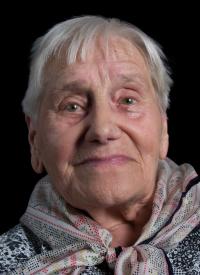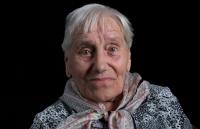Stick to the land. If you have land, you have a potato.

Download image
Žofie Machničová was born in 1922 in Zavydovo, near Mukachevo, in Carpathia Ruthenia. She was the youngest of eight siblings. Her father died when she was five. After leaving primary school she left for Czechoslovakia in 1937. Together with her sister and later alone she worked at farms in Dohalice and Barchov, Eastern Bohemia. After the war she married and together with her husband she worked in agriculture, first on their own farm, later in a cooperative. From 1960 she was employed with the Czech Railway as a signalwoman. In 1980, on retirement, she moved to Prague with her second husband Vasil Machnič, a veteran of the Eastern front. Her husband died in 1989. Since 2017 Žofie Machničová has lived in the Home of War Veterans, Central Military Hospital Prague.

